Adverbs are words that do not change (they are not declined) and they modify the verb’s meaning, an adjective or other adverb.
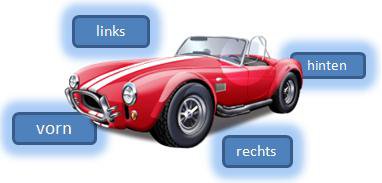
| Adverb | Meaning |
|---|---|
| vorgestern | the day before yesterday |
| gestern | yesterday |
| heute | today |
| morgen | tomorrow |
| übermorgen | the day after tomorrow |
| Adverb | Meaning |
|---|---|
| damals | then |
| früher | earlier |
| jetzt | now |
| sofort | immediately |
| gleich | immediately |
| bald | soon |
| später | later |
| dann | after/then |
The adverb gerade is used to make the present continuous in German:
Ich lese gerade die Zeitung
I am reading the newspaper
| Adverb | Meaning |
|---|---|
| immer | always |
| fast immer | almost always |
| meistens | most of the time |
| häufig | frequently |
| oft | often |
| ab und zu | once in a while |
| manchmal | sometimes |
| selten | rarely |
| fast nie | almost never |
| nie | never |
| Adverb | Meaning |
|---|---|
| morgens | in the morning |
| nachmittags | in the afternoon |
| abends | in the evening |
| nachts | during the night |
| Adverb | Meaning |
|---|---|
| montags | on Mondays |
| dienstags | on Tuesdays |
| mittwochs | on Wednesdays |
| donnerstags | on Thursdays |
| freitags | on Fridays |
| samstags | on Saturdays |
| sonntags | on Sundays |
| Adverb | Meaning |
|---|---|
| täglich | daily |
| wöchentlich | weekly |
| monatlich | monthly |
| jährlich | yearly/annually |
Often, temporal adverbs of frequency are formed from nouns with an "–s" added on. At first, this construction creates a bit of confusion among students of German.
| Noun | Adverb |
|---|---|
| der Abend the evening | abends in the evenings |
| der Halbtag half a day | halbtags half-day |
| der Feiertag the holiday | feiertags every holiday |
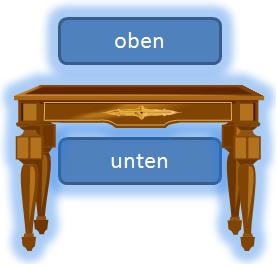
| Adverb | Meaning |
|---|---|
| vorn / vorne | in front |
| hinten | behind |
| links | on the left |
| rechts | on the right |
| oben | up |
| unten | down |
| innen | inside |
| außen | outside |
| hier | here |
| da | there |
| dort | there |
| überall | everywhere |
| nirgends | nowhere |
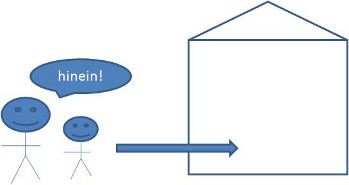
Locative adverbs with the particles "hin" and "her". The particles "hin" and "her" denote the direction of movement with respect to the person that is speaking. These particles are used often to make adverbs.
Here are some examples so that you understand better:
If my child and I are outside of the house and I want to tell him to go inside (for example, to do his chores), I’d say:
Geh hinein!
Go inside!
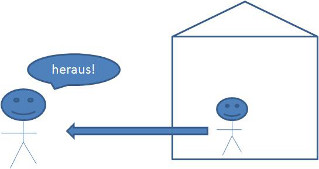
If I am outside of the house and my child is inside and I want him to come out (for example, to cut the grass), I’d say:
Komm heraus!
Come outside!
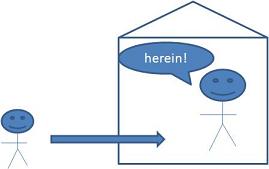
If I am inside the house and my son is playing in the garden and I want him to come in (for example, to eat), I’d say:
Komm herein!
Come inside!
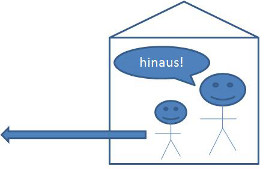
If my child and I are inside the house and I want to tell him to go out (for example, to play in the garden), I’d say:
Geh hinaus!
Go outside!
| Adverb | Meaning |
|---|---|
| aufwärts | upwards |
| abwärts | downwards |
| vorwärts | forwards |
| rückwärts | backwards |
| heimwärts | homeward |
| westwärts | to the west |
| bergauf | uphill |
| bergab | downhill |
In German, locative adverbs are also formed by adding an "–s" to nouns.
| Noun | Locative adverb |
|---|---|
| das Rechte right | rechts to the right |
| die Linke left | links to the left |
Causal adverbs indicate the reason or origin of an action.
| Adverb | Meaning |
|---|---|
| deshalb | therefore |
| darum | therefore |
| deswegen | therefore |
| folglich | thus/consequently |
| daher | therefore |
Causal adverbs serve as a connection between two sentences, given that they’re Konjunktionaladverbien
Ich möchte in Deutschland leben, deshalb lerne ich gerade Deutsch
I would like to live in Germany, therefore I am learning German
It must be emphasized that adverbs occupy a position and by placing them at the beginning of a sentence, they move the subject to the 3rd position.
Main Article: Sentence structure
| Adverb | Meaning |
|---|---|
| erstens | firstly |
| zweitens | secondly |
| drittens | thirdly |
| auch | also |
| ebenfalls | as well |
| ansonsten | otherwise |
| außerdem | in addition |
| Adverb | Meaning |
|---|---|
| nur | only |
| wenigstens | at least |
| hingegen | on the other hand |
| Adverb | Meaning |
|---|---|
| sehr | very |
| kaum | hardly |
The adverb "gern" is used often in German and it’s equivalent is "gladly".
The construction "Ich hätte gern…" is very common in German and means "I would like to" and is used to politely order something.
gern or gerne are exactly the same but gern is used more often.
Pronoun adverbs are the combination of a preposition and a pronoun and are used only to refer to things (not for living things).
The adverbs "da-" + preposition are used very often and their translation depends greatly on the context:
Ich habe nicht daran gedacht
I didn’t think about that
| Adverb | Meaning |
|---|---|
| daran (or dran) | at it (preposition an) |
| darauf (or drauf) | on it (preposition auf) |
| daraus | from it (preposition aus) |
| dabei | present (preposition bei) |
| dagegen | against it (preposition gegen) |
| darin | in it (preposition in) |
| damit | with it (preposition mit) |
| darüber | about it (preposition über) |
| darum | therefore (preposition um) |
| dazu | additionally (preposition zu) |
The prepositions are not exactly the same in German and English and thus the translation is not exact. Check out prepositions to get the best translation in every case.
The adverbs "hier-" + preposition have practically the same meaning as adverbs da + "preposition" though they are used much less often. Their meaning depends greatly on the context.
| Adverb | Meaning |
|---|---|
| hieran | at this (preposition an) |
| hierauf | on this (preposition auf) |
| hieraus | from this (preposition aus) |
| hierbei | with this or at this (preposition bei) |
| hiergegen | against this (preposition gegen) |
| hierin | in this (preposition in) |
| hiermit | with this (preposition mit) |
| hierüber | about this (preposition über) |
| hierzu | for this (preposition zu) |
Main article: Interrogative particles
The most important interrogative adverbs are:
Wie (how)
| Wo (where)
|
Some adverbs can make comparatives and superlatives like adjective. This is the case with "bald", "gern", "oft", and "wohl".
| Adverb | Comparative | Superlative |
|---|---|---|
| bald soon | eher sooner | am ehesten soonest |
| gern gladly | lieber preferably | am liebsten most preferably |
| oft often | öfter more often | am häufigsten most often |
| wohl well | wohler better | am wohlsten best |
In many cases, adjectives can function like adverbs:
Das Auto ist schnell [schnell as an adjective]
The car is fast
Sie isst schnell [schnell as an adverb]
She eats fast